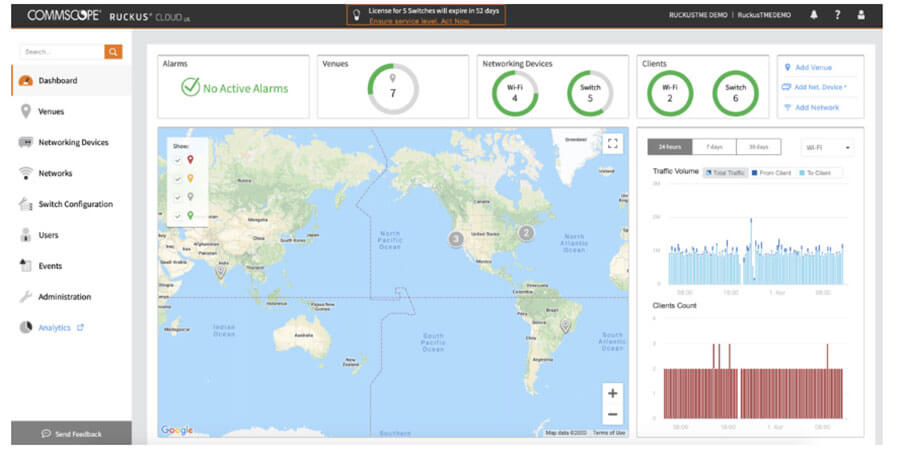CommScope has announced RUCKUS Cloud, an AI-enabled network management as-a-service platform that enables enterprise IT and managed service providers (MSPs) to easily manage a converged wired and wireless network.
Aided by machine learning (ML) and artificial intelligence (AI) and built on a programmable microservices foundation, the platform merges singlepane management with network visibility and service assurance. This allows IT teams to troubleshoot faster and proactively improve the user experience.
According to market research firm Omdia, the cloud-managed networking market is growing at a compound annual growth rate of 28.7%, with equipment revenues forecasted at $5.5 billion and software-as-a-service revenues forecasted at $1.8 billion by 2023.
Overall, it is estimated that public cloudmanaged networking deployments will account for 14% of enterprise networking revenue by 2023, and in the Wi-Fi segment, nearly a quarter of the installed base of access points will be managed through a public cloud platform.
“Networks are changing rapidly, with accelerating growth in users, network elements, devices and device diversity that’s driving a new level of network complexity, making it difficult for IT organizations to keep up,” said Matthias Machowinski, Omdia senior research director, enterprise networks. “Modern cloudmanaged networking and ML/AI-based assurance tools provide automation and in-depth network insights, promising to give control back to the IT organization and deliver greater efficiency.”
The RUCKUS Cloud platform is built using a microservices-based, controller-in-the-cloud architecture that ensures full programmability, scalability, high availability, and rapid fix and feature rollout.
RUCKUS Cloud is tightly coupled with RUCKUS Analytics, yielding an integrated management and network intelligence cloud service that requires no on-premises hardware and features:
Unified wired and wireless management - Intuitive, intent-based workflows expedite provisioning, management, and control from large venues to hundreds or thousands of sites.
ML and AI - Analytics tools enable IT to react quickly to issues and stop network anomalies from rising to the service-affecting level.
RESTful APIs – OpenAPI - compliant APIs allow IT to automate any network function, create custom dashboards and reports, and easily integrate RUCKUS Cloud into existing enterprise systems.
MSP dashboard - Allows MSPs to offer branded services and manage multiple end customers.
Network health monitoring - IT teams can define and measure performance against service level agreements (SLAs) that best reflect the requirements of their users.
Remote client troubleshooting - Remote access to connection history and clearly identified points of failure facilitate a rapid response to user-reported network issues, regardless of client location.
Planning and reporting - 12 months of included historical device- and element-level data helps IT make well-informed network planning decisions.
“Enterprise IT operations and managed service providers can realize significant efficiency and user experience gains,” said Pramod Badjate, senior vice president and general manager for CommScope’s RUCKUS portfolio. “These gains will continue to accrue as we introduce new ML and AI capabilities that will, over time, make the network more autonomous and self-healing.”
RUCKUS Cloud is a foundational element of CommScope’s vision for the enterprise in which every element of the distributed connectivity and power delivery fabric is monitored by a single analytics engine and managed from a single, cloud-based console. CommScope uniquely offers every element of this fabric, including Wi-Fi and switching, copper and fiber structured cabling, and in-building cellular connectivity.
CommScope customers are saying:
Kyle Thompson, acoount manager at Pine Cove Consulting (one of CommScope’s customers), said, “RUCKUS Cloud is a simple and easy-to-use product that makes network management painless for any network admin.”
“Combined with reliable RUCKUS hardware, it lets administrators quickly and easily deploy networks with minimal intervention. If intervention is needed, the integral service assurance features let administrators know where the trouble lies and what’s causing it, avoiding unnecessary steps in the troubleshooting process,” he added.
“We installed RUCKUS Cloud right before the pandemic. With shelter-in-place, our operating model changed overnight from live events at multiple sites to live-streaming simultaneous HD camera feeds to hundreds of members,” said Tyler Faria, technology director at Westside Church. “Our previous network couldn’t even handle the connections, and I had to send someone to each site in order to make network changes. Now, we manage multiple networks from one interface, remotely – even during live-streaming events – and a single Wi-Fi 6 AP at each site handles those video streams. We spend no time traveling to multiple sites and far less time managing what is now one network. And we do far more with the time we do spend.”





